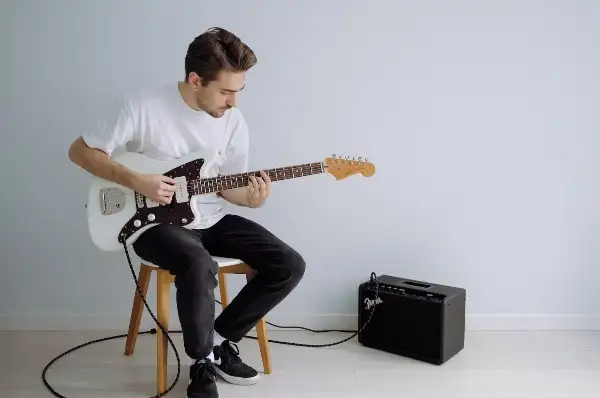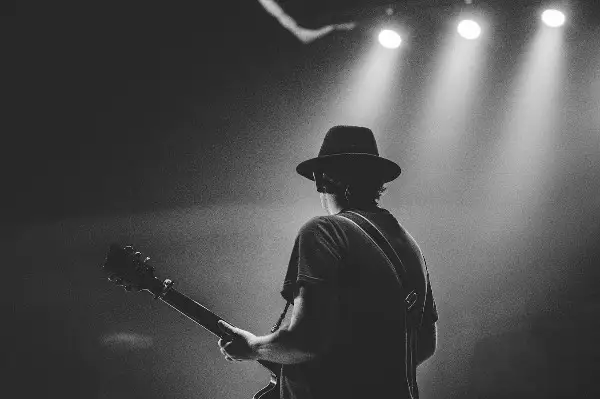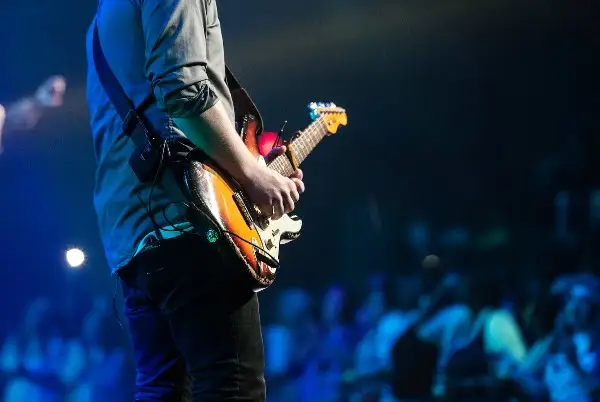Great guitar tracks are unlike anything else.
From solos that rip through the speakers to ambient fingerstyle beds that provide the foundation for upfront leads, there are infinite ways to approach a guitar track.
While you could certainly use guitar VSTs or samples in your productions, it never quite feels the same as having the sound of a live guitar that gels with your production.
Of course, you might not be a guitarist. And, even if you are, you might not have the recording know-how to lay down your own high-quality guitar progressions or melodies.
This is where session guitarists come in.
Today, we're going to dive in and explore the ins and outs of session guitarists, including who they are, what they do, and where to find them.
Tune up, tune in, and let's get started.
What Is a Session Guitarist?

Session guitarists are professional musicians who either record or play live guitar for different bands, artists, and projects. Unlike actual members of a band, session guitarists are typically short-term independent contractors or hired guns.
The job of a session guitarist can vary from project to project, as some might only play smaller parts on a studio single, while others might go and play live on something as big as an international tour.
What Does a Session Guitarist Do?
A session guitarist is typically put under contract, and the requirements of that guitarist will depend on the needs of the project.
The contractual obligations can be as simple as playing an improved solo over a backing track for a studio single or as in-depth as writing rhythm and lead parts across an entire album.
We can break session guitarists down into two basic categories:
Studio Guitarists
Artists or producers will hire studio guitarists when they are looking for someone to record on a single or album.
The parts for these studio sessions are sometimes written ahead of time, though other times, guitarists will compose parts for these songs. From rhythm guitar to lead guitar to solos, the type of composition will depend on the project.
Many session guitarists are known for their versatility, as they are often required to play and write for different genres. The best session players have a wide range of gear to dial in different tones and have the ability to hop on various projects and blend in with ease.
Live Guitarists
Then, we have live guitarists who either play in the backing band for an artist on a particular show or get contracted to play on tours.
Artists or managers will often hire these live session guitarists, and the pay will depend on how many shows they are playing and whether or not they are touring. Artists will also have to factor in the cost of rehearsal when hiring a live guitarist.
More often than not, the parts for these live shows are pre-written, allowing the guitars to listen to them and practice them ahead of time.
Of course, there are also times when studio guitarists will double as the live or touring guitarists, as they have already become acclimated to the material.
Benefits of Hiring a Studio Musician or Touring Guitarist

Versatility is one of the main benefits of hiring a session guitarist. Whether you need someone with serious chops to deliver a solo on your next rock hit, or you need someone to lay down some buttery neo-soul chords over your lo-fi backing track, you can find a session player to help you out.
The guitar is an incredibly difficult instrument to imitate with software. With the amount of time and energy it would take to find the perfect samples or automate the many nuances of a well-played guitar, you may as well just hire somebody that can do it in a heartbeat.
Plus, when you hire a session musician, you get complete control over what’s played and how it sounds. By letting a professional do all the hard lifting, you don't have to feel the pressure of doing it all yourself.
No matter what kind of project you are working on, whether big or small, hiring a session guitarist can be majorly beneficial. The options are pretty much endless, and there are millions of guitarists out there looking for work every day. You might just want to find somebody to play a few cool licks in A Major so you can chop them up and sample them at a later time, and we guarantee you'll be able to find somebody to do so.
As the cherry on top, you open up new doors in your network and learn how to collaborate with others.
If you need a guitarist in the future, you'll have one in your back pocket.
Where To Find a Session Guitar Player
Finding a session guitar player can be pretty easy if you live in a big city with a decent music scene. All you have to do is go out to shows and try to meet guitarists you see playing live. Nothing is better than building a community in your area.
However, there are also plenty of online platforms, such as SoundBetter, where you can find professional guitarists and other instrumentalists to hire remotely. The beauty of these kinds of platforms is that they connect musicians from all over the world with different styles and backgrounds.
You may even consider putting out an ad on a job or classified sites, such as Craigslist or Upwork.
The options are near endless.
Working With Session Guitarists

If you're looking to hire a session player for the very first time, you might feel a little bit nervous. However, as long as you have everything prepared and feel confident about your project, you'll be good to go.
Here are a few things you should get together before hiring a session player for your project:
Have Your Tracks Prepared
If you're hiring a studio guitarist to come and record, make sure that your recordings are ready for them to play on.
If you're sending them files to work with remotely, make sure everything in the session is clearly labeled.
The last thing you want is for your hired gun to have to search through hundreds of unorganized files or song versions to find what they are looking for. The more organized you are, the easier it will be for the hired guitarist to do their job.
Be Communicative
What kind of guitar do you need for this project?
It's important to give session guitarists clear instructions as to what you need for your project. Before reaching out to anyone, sit down and try to determine what exactly you want to hear and figure out a way to put it into words. It can often be helpful to send references for feel or tone.
Tell them what kinds of parts you want them to play in different sections of the song, such as muted power chords in the verse and long, open strums in the chorus.
How Can I Become a Session Guitarist?

Whether you play guitar, drums, bass, or tuba, becoming a session musician means having years of practice and work under your belt. In fact, many session musicians have music education backgrounds, whether they have graduated from esteemed universities or were self-taught.
It is also important to note that many session guitarists are Swiss army knives in terms of style, as they have to be prepared for any kind of gig to come their way.
To get started, you need to hone your skills and broaden your playing style. Once you feel confident about your playing, you can begin building an online presence and meeting other session players.
We recommend building a website or at least a social media platform that can showcase your playing, your past work, and any personal demos. Show people what kind of guitar skills you offer and why they should hire you over someone else.
Remember, session musicians are professionals. You have to think of it as a career over everything else. Everything you do presents an opportunity to push you further or take you one step back, so always be learning, meeting new people, and working.
Hiring a Session Guitar Player for Your Next Project
Some of the most iconic artists of all time used session guitarists in their recording sessions and live performances, including Elvis Presley, the Beach Boys, Michael Jackson, Jimi Hendrix, Paul McCartney, Miles Davis, and more.
Whether you need a recorded guitarist for a major recording session or a live player to take with you on the road, find yourself a good guitar player that can adapt to many styles.





